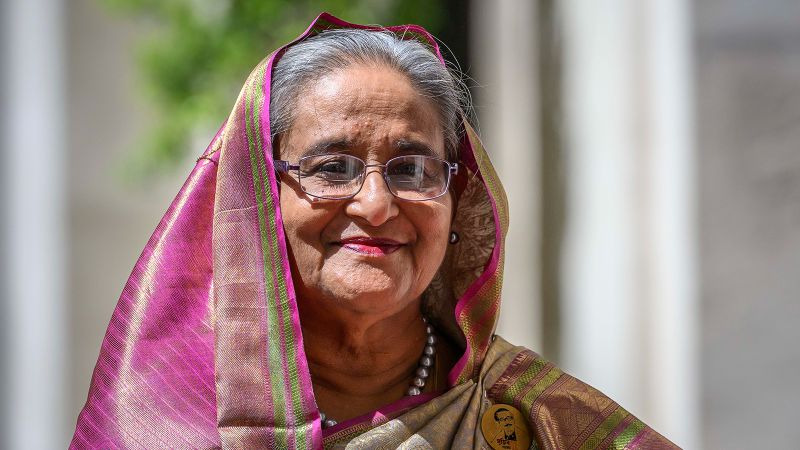Bangladesh's Ousted Prime Minister Sheikh Hasina Indicted by Tribunal Amid Ongoing Uprisings

In a significant development for Bangladesh's political landscape, a special tribunal has indicted the country's former Prime Minister Sheikh Hasina on Thursday, accepting charges of crimes against humanity linked to a violent uprising that tragically resulted in the deaths of hundreds of students last year. The indictment comes amid a complex backdrop of political turmoil and allegations against Hasina's leadership.
A three-member panel overseeing the tribunal, led by Justice Golam Mortuza Mozumder, has formally indicted Hasina, alongside former Home Minister Asaduzzaman Khan and the former police chief Chowdhury Abdullah Al-Mamun, on five specific charges. Notably, both Hasina and Khan are being tried in absentia as they are currently outside the jurisdiction of the tribunal.
In response to the tribunal's decision, the Awami League, Hasina’s political party, vehemently condemned the trial proceedings, labeling the tribunal a "kangaroo court"—a term used to describe a judicial process that is perceived as illegitimate or lacking in fairness.
The tribunal commenced its proceedings on June 5, with authorities making efforts to summon both Hasina and Khan back to Bangladesh by publishing advertisements in major newspapers. Since August 5, Hasina has been in exile in India, following a tumultuous political environment in which she was ousted from power. Meanwhile, Khan is believed to be in a similar situation.
In a notable turn of events, Al-Mamun, who was arrested and appeared before the tribunal on the same day as the indictment, admitted his guilt. He expressed his intention to provide a statement that would support the prosecution's case in due course. Chief Prosecutor Mohammad Tajul Islam later confirmed that Al-Mamun had asked to become an "approver," meaning he would testify against his former associates in exchange for a potentially lighter sentence.
The prosecution presented various forms of evidence, including a leaked audio recording featuring Hasina, alongside other documents intended to substantiate the claims against her. A petition filed by lawyer Amir Hossain, representing Hasina and Khan, seeking their names to be removed from the case, was rejected by the tribunal.
The tribunal has scheduled significant dates for the trial: August 3 for the prosecution's opening statement and August 4 for the recording of witness testimonies.
In a post shared on the platform X, the Awami League criticized the administration led by Nobel Peace Prize laureate Muhammad Yunus, accusing it of manipulating the judiciary for political gain. The party emphasized that public trust in the judicial system has diminished due to what they termed as the 'Yunus regime's' misuse of state institutions to target dissenters. Their statement condemned the indictment against Hasina and characterized it as part of a broader campaign of persecution against their party.
The prosecution's charges outlined Hasina's alleged direct involvement in orchestrating violent actions against civilians during the uprising, which resulted in mass casualties, especially among vulnerable groups such as women and children. They painted her as the "mastermind, conductor, and superior commander" responsible for the atrocities described in detail in the indictment.
To complicate matters further, the interim government in Bangladesh has enacted a ban on the Awami League party and modified legal frameworks to facilitate the trial of former ruling party members concerning their actions during the recent uprisings.
In February, the United Nations human rights office reported that as many as 1,400 individuals had lost their lives during a series of crackdowns on student-led protests against Hasina's administration, with violence escalating even further in the weeks following her ousting.
Earlier this month, the tribunal imposed a six-month jail sentence on Hasina for contempt of court after she allegedly claimed to possess a "license to kill" in a controversial leaked audio recording. This ruling marked the first conviction against Hasina since her departure from Bangladesh.
The contempt case was triggered by a phone conversation supposedly featuring Hasina, in which she purportedly states, "There are 227 cases against me, so I now have a license to kill 227 people." This inflammatory remark has fueled the fire of public outcry against her and her former government.
It is worth noting that the tribunal responsible for these proceedings was established by Hasina herself in 2009, with the initial aim of investigating and prosecuting crimes related to Bangladesh's independence war against Pakistan in 1971. Over the years, this tribunal has been instrumental in trying politicians—primarily associated with the Jamaat-e-Islami party—for their conduct during that tumultuous period in the nation's history. Under the leadership of Sheikh Mujibur Rahman, Hasina's father, Bangladesh fought for and gained independence from Pakistan, laying the groundwork for the country's current political structure.




























